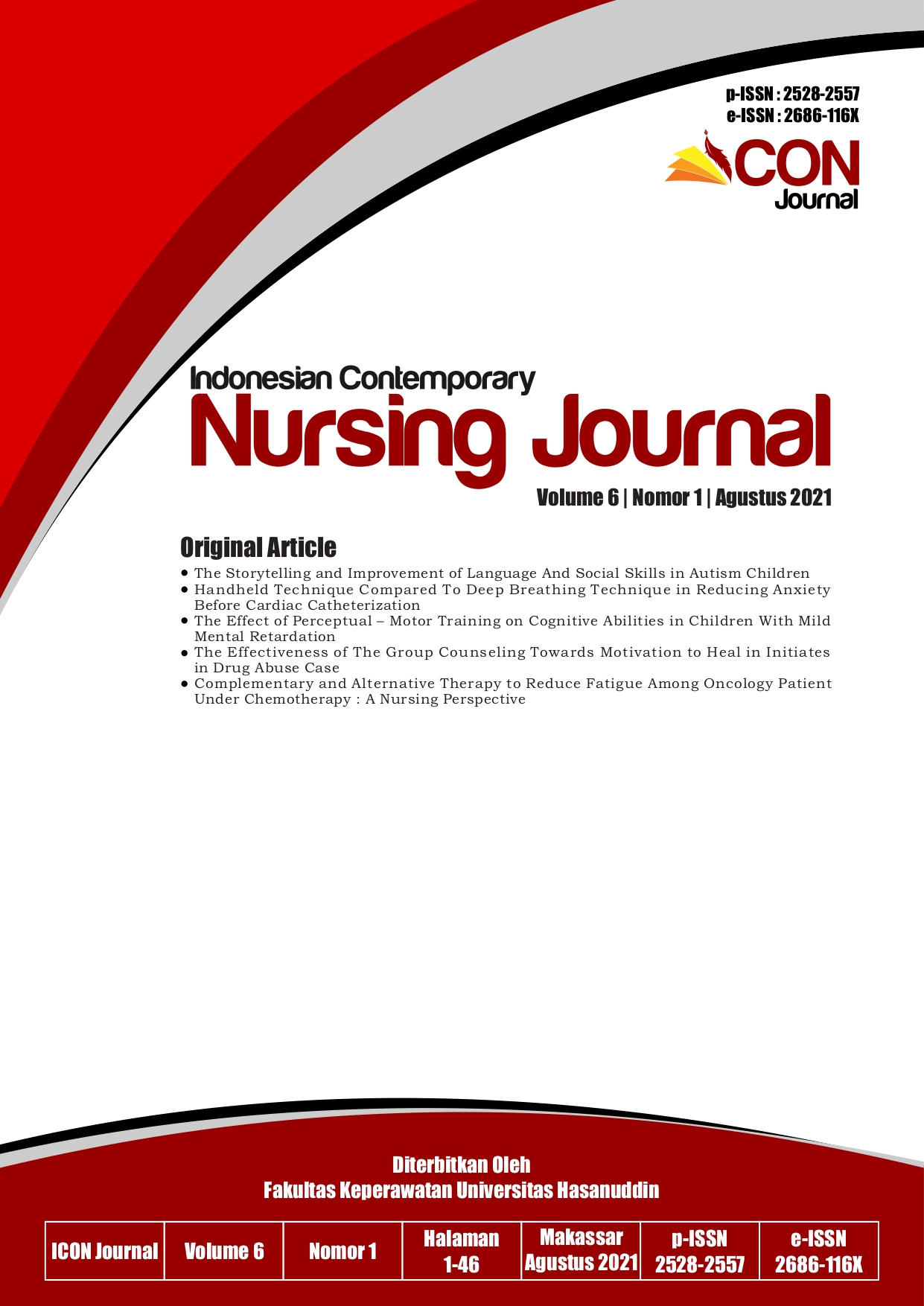The Effect of Perceptual – Motor Training on Cognitive Abilities in Children with Mild Mental Retardation
DOI:
https://doi.org/10.20956/icon.v6i1.10052Keywords:
Perceptual – Motor Training, Cognitive Abilities, Mild Mental RetardationAbstract
Introduction: Children with mental retardation are the children who have incomplete mental development, there are an obsctacles during the child’s development that effect their cognitive, motoric, sensory, physical, language, and emotional development. This study aims to determine the effect of perceptual – motor training on changes in cognitive abilities in children with mild mental retardation. Method: This study used a quasi-experimental design with the type of one group pre test and post test. The instrument used montreal – cognitive assessment which consists of 7 cognitive aspects test. The subjects of this study were children with mild retardation from SLB Laniang Makassar who were able to communicate even though the children needed repetition instructions for several times and their aged 10-14 years old. The number of respondent was 17 peoples (out of dropout) and underwent perceptual-motor training for 4 weeks (12 times treatments). Results: The results of this study after Shapiro Wilk normality test obtained normal distribution data (p >0.05), then carried out hypothesis test used Paired T - Test and obtained a significant value p = 0,000 (p <0.05). The results of the data analysis from the pre test and post test showed an increase on cognitive abilities. Conclusion: This shows that there is an effect of perceptual – motor training on changes in cognitive abilities in children with mild mental retardation.
References
Afshari, J. (2012). The effect of perceptual-motor training on attention in the children with autism spectrum disorders. Research in Autism Spectrum Disorders, 6(4), 1331–1336. https://doi.org/10.1016/j.rasd.2012.05.003
Ardiyanto, A. (2016). Peran Perceptual Motoric terhadap Perkembangan Gerak Anak. Universitas PGRI Semarang.
Azar, F. O., & Akbar, P. S. (2018). The Effect of Perceptual- Motor Training on Children ’ s Development Motor Skills Aged B etween 8 to 11 with High Function Autistic Disorder ( HFA ). 2(2), 1–11.
Bassani, S., Zapata, J., Gerosa, L., Moretto, E., Murru, L., & Passafaro, M. (2013). The neurobiology of x-linked intellectual disability. Neuroscientist, 19(5), 541–552. https://doi.org/10.1177/1073858413493972
Bathina, S., & Das, U. N. (2015). Brain-derived neurotrophic factor and its clinical Implications. Archives of Medical Science, 11(6), 1164–1178. https://doi.org/10.5114/aoms.2015.56342
Borror, A. (2017). Brain-derived neurotrophic factor mediates cognitive improvements following acute exercise. Medical Hypotheses, 106(June), 1–5. https://doi.org/10.1016/j.mehy.2017.06.024
Demarin, V. (2014). Periodicum Biologorum · June 2014. 116, No 2(January).
Dinoff, A., Herrmann, N., Swardfager, W., & Lanctôt, K. L. (2017). The effect of acute exercise on blood concentrations of brain-derived neurotrophic factor in healthy adults: a meta-analysis. European Journal of Neuroscience, 46(1), 1635–1646. https://doi.org/10.1111/ejn.13603
Fissler, P., Küster, O., Schlee, W., & Kolassa, I. T. (2013). Novelty interventions to enhance broad cognitive abilities and prevent dementia: Synergistic approaches for the facilitation of positive plastic change. In Progress in Brain Research (Vol. 207). https://doi.org/10.1016/B978-0-444-63327-9.00017-5
Hakim, A. (2018). Mendorong Perkembangan Kognitif Anak Tunagrahita Melalui Permainan Edukatif. Jurnal Ilmiah Penjas, 4(3), 11–20.
Irfan, M. (2010). Fisioterapi bagi Insan Stroke (Pertama). Jogjakarta: Graha Ilmu.
Johnston, & Ramon. (2011). Perceptual-motor activities for children : an evidence-based guide to building physical and cognitive skills. USA: Versa Press.
Karghand, Z. A., & Pour, M. E. (2016). The Effect of Perceptual-Motor Activities Training on Gross Motor Skills of Autistic Children Research Method. Research Communications in Psychology, Psychiatry and Behaviour, 6(3), 23–26. https://doi.org/10.14331/ijfpss.2016.330060
Kemdikbud. (2017). Statistik sekolah luar biasa (SLB) 2016/2017. Pusat Data Dan Statistik Pendidikan Dan Kebudayaan, 1–147.
Lestari, E., Purnamasari, N., & Wahab, B. (2020). Pengaruh Dual-Task Training ( Motor-Cognitive ) Terhadap Memori Jangka Pendek Pada Anak Usia Sekolah Program Studi S1 Fisioterapi Fakultas Keperawatan Universitas Hasanuddin Makassar 4(1), 9–19.
Lukmawati, L., Sriyanto, M. I., & Syamsuddin, M. M. (2019). Pengaruh Perceptual Motor Training (Pmt) Terhadap Perkembangan Motorik Kasar Pada Anak Usia 5-6 Tahun. Kumara Cendekia, 7(2), 175. https://doi.org/10.20961/kc.v7i2.36386
Mandolesi, L., Polverino, A., Montuori, S., Foti, F., Ferraioli, G., Sorrentino, P., & Sorrentino, G. (2018). Effects of physical exercise on cognitive functioning and wellbeing: Biological and psychological benefits. Frontiers in Psychology, 9(APR), 1–11. https://doi.org/10.3389/fpsyg.2018.00509
Mohammadabad, M. S., & Shahbazi, S. (2017). Effectiveness of Perceptual – Motor Training on Reaction Time and Anticipation Children with Hyperactivity Disorder / Attention Deficit Department of Physical Education , Faculty of Human Sciences , Department of Motor Behavior , University of Medical Sci. 38–47.
Pediatrics, A. A. of, & Guidelines, B. F. (2017). Estimated Prevalence of Children With Diagnosed Developmental Disabilities in the United States, 2014–2016. NCHS Data Brief, (291), 18–19. Retrieved from http://www.ncbi.nlm.nih.gov/pubmed/29235982%0Ahttp://pediatrics.aappublications.
Pratiwi, I. C., Woro, O., Handayani, K., & Raharjo, B. B. (2017). Kemampuan Kognitif Anak Retardasi Mental Berdasarkan Status Gizi. Public Health Perspective Journal, 2(1), 19–25.
Pusat Data dan Statistik Pendidikan dan Kebudayaan Kemendikbud RI. (2018). Rangkuman Statistik Persekolahan. Retrieved from http://publikasi.data.kemdikbud.go.id/uploadDir/isi_2B40A310-F17C-4315-AF34-1FBA51252C56_.pdf
Suryani, N., & Mumpuniarti, M. (2018). Kekuatan Kognitif Siswa Tunagrahita Ringan Terhadap Kegiatan Pembelajaran Keterampilan Budidaya Hortikultura. Pembelajar: Jurnal Ilmu Pendidikan, Keguruan, Dan Pembelajaran, 2(2), 101. https://doi.org/10.26858/pembelajar.v2i2.5760
Sutinah, S. (2019). Terapi Bermain Puzzle Berpengaruh Terhadap Kemampuan Memori Jangka Pendek Anak Tunagrahita. Jurnal Endurance, 4(3), 630. https://doi.org/10.22216/jen.v4i3.4385
Tecklin, J. S. (2015). Pediatric Physical Therapy (5th ed.). Philadelphia: Lippincott Williams & Wilkins.
Downloads
Published
How to Cite
Issue
Section
License
Authors who publish with this journal agree to the following terms:Authors retain copyright and grant the journal right of first publication with the work simultaneously licensed under a Creative Commons Attribution License that allows others to share the work with an acknowledgement of the work's authorship and initial publication in this journal.
Authors are able to enter into separate, additional contractual arrangements for the non-exclusive distribution of the journal's published version of the work (e.g., post it to an institutional repository or publish it in a book), with an acknowledgement of its initial publication in this journal.
Authors are permitted and encouraged to post their work online (e.g., in institutional repositories or on their website) prior to and during the submission process, as it can lead to productive exchanges, as well as earlier and greater citation of published work (See The Effect of Open Access).
Accepted 2021-08-30
Published 2021-08-31



